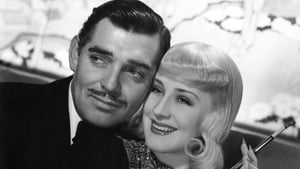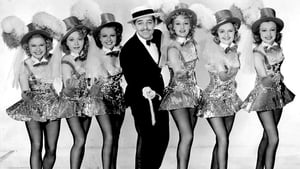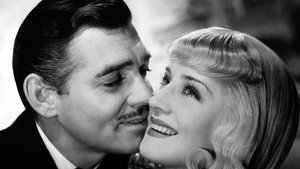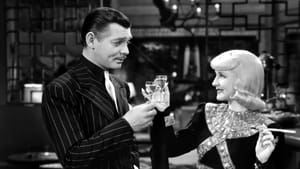Contact: info@alwanfilm.com
Video Sources 0 Views
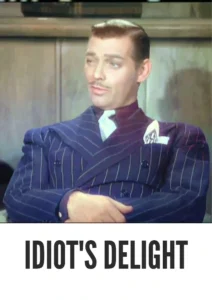
Synopsis
Review: Idiot’s Delight 1939 Colorized – A Timeless War Comedy Drama

Introduction
In the golden era of Hollywood, certain films have emerged as timeless classics, resonating with audiences through the decades. “Idiot’s Delight” (1939) is one such gem, a war comedy-drama that skillfully blends satire with poignant social commentary. Directed by the legendary Clarence Brown and starring screen icons Clark Gable and Norma Shearer, this film offers a unique take on the tumultuous times leading up to World War II. In this article, we will delve into the essence of “Idiot’s Delight,” exploring its story, performances, and its enduring significance in cinematic history.
Check The Full Colorized Movies List
Check Our Colorized Movies Trailer Channel
Understanding Idiot’s Delight 1939 Colorized: Director, Cast, and Genre
Directed by Clarence Brown, a filmmaker known for his versatility and craftsmanship, “Idiot’s Delight” is based on the Pulitzer Prize-winning play by Robert E. Sherwood. The film features a stellar cast, with Clark Gable in the lead role of Harry Van, a charismatic song-and-dance man, and Norma Shearer as Irene Fellara, a mysterious and alluring woman with a complex past.
The film falls within the war comedy-drama genre, a unique blend that allows it to tackle serious themes with a touch of humor and wit. Brown’s vision for “Idiot’s Delight” was to create a film that not only entertained but also provoked thought and reflection on the political tensions of the era.
Exploring the World of Idiot’s Delight 1939 Colorized: Plot and Characters
“Idiot’s Delight” is set against the backdrop of Europe on the brink of World War II. The story follows Harry Van, a vaudeville performer, who finds himself in an Alpine resort amidst a diverse group of international guests. As political tensions rise, Harry reunites with Irene Fellara, a woman he once knew under different circumstances.
The film’s narrative weaves together moments of comedy, romance, and drama, capturing the uncertainty and fear of a world on the verge of conflict. Harry Van’s character is a charming and resilient performer who uses humor to navigate the complexities of life, while Irene Fellara embodies mystery and intrigue, revealing layers of vulnerability and strength as the story unfolds.
The Art of Adaptation: From Stage to Screen
Adaptation from stage to screen is an art form in itself, requiring a delicate balance between staying true to the original material and leveraging the strengths of the cinematic medium. “Idiot’s Delight” is a prime example of how this can be successfully achieved. The transition from Sherwood’s play to Brown’s film involved expanding the scope of the narrative while preserving the play’s core themes and dialogue.
The film adaptation allowed for more elaborate settings and a dynamic visual style that brought the story’s wartime context to life. Clarence Brown’s direction ensured that the film retained the play’s sharp wit and social critique, while also making full use of the cinematic tools at his disposal, such as expressive close-ups and sweeping landscapes.
Early Hollywood and the Political Landscape
“Idiot’s Delight” was released in 1939, a year often regarded as one of the greatest in Hollywood history. This period was marked by the looming threat of global conflict, and many films of the time reflected the anxieties and tensions of the era. Hollywood’s role in shaping public perception of international events was significant, with filmmakers using their craft to comment on the political landscape and influence audience sentiment.
The film’s release during this critical juncture adds to its historical significance. It serves as a time capsule, capturing the pre-war atmosphere and offering insights into the mindset of the era. Through its satire and dramatic elements, “Idiot’s Delight” provides a window into the complexities of international relations and the human cost of impending war.
The Performances: Gable and Shearer Shine
Clark Gable’s portrayal of Harry Van is nothing short of iconic. Known for his charm and charisma, Gable brings a lighthearted yet poignant touch to the character, embodying the resilience and optimism of a performer in uncertain times. His on-screen chemistry with Norma Shearer is palpable, adding depth and authenticity to their interactions.
Norma Shearer’s performance as Irene Fellara is equally compelling. Shearer, renowned for her ability to convey emotional nuance, captures the enigmatic nature of Irene with grace and sophistication. Her portrayal adds layers of complexity to the character, making her both relatable and intriguing.
The Film’s Themes and Social Commentary
At its heart, “Idiot’s Delight” is a film about the human spirit’s ability to endure and find light even in the darkest of times. The film’s themes of resilience, hope, and the absurdity of war resonate strongly, offering a critique of the political machinations that lead to conflict. Through humor and drama, the film underscores the folly of nationalism and the common humanity that binds us all.
The characters in the film, representing various nationalities and perspectives, serve as a microcosm of the broader world, illustrating the diversity of experiences and the shared fears of an uncertain future. The film’s satirical edge, combined with its heartfelt moments, creates a powerful narrative that speaks to the enduring nature of the human condition.
The Cinematic Techniques of Clarence Brown
Clarence Brown’s direction in “Idiot’s Delight” is a masterclass in cinematic storytelling. Known for his ability to elicit strong performances and his keen eye for visual composition, Brown creates a film that is both visually stunning and emotionally resonant. His use of lighting, framing, and pacing enhances the narrative, drawing viewers into the story’s emotional core.
Brown’s skillful direction ensures that the film’s comedic and dramatic elements are seamlessly integrated, creating a cohesive and engaging viewing experience. His ability to balance humor with poignancy allows the film to address serious themes without becoming overly somber, maintaining a sense of hope and humanity throughout.
The Musical Elements: Songs of War and Peace
Music plays a pivotal role in “Idiot’s Delight,” enhancing the film’s emotional impact and thematic resonance. The musical numbers performed by Clark Gable’s character, Harry Van, serve as both entertainment and commentary, reflecting the film’s broader themes of resilience and unity.
The film’s soundtrack, featuring a mix of lively vaudeville tunes and poignant ballads, adds depth to the narrative and provides a contrast to the escalating tensions of the story. The songs act as a reminder of the enduring power of art and music to bring people together, even in the face of adversity.
The Legacy of Idiot’s Delight 1939 Colorized
“Idiot’s Delight” has left an indelible mark on the world of cinema, influencing subsequent generations of filmmakers and audiences alike. Its blend of humor, drama, and social critique has made it a timeless classic, resonating with viewers across different eras.
The film’s legacy is further cemented by its critical and commercial success upon release. Nominated for several Academy Awards, including Best Actress for Norma Shearer, “Idiot’s Delight” received widespread acclaim for its performances, direction, and screenplay. Its enduring popularity is a testament to its universal themes and compelling storytelling.
The Debate Over War Comedies
The genre of war comedy-drama, while beloved by many, has often sparked debate within the cinematic community. Critics and audiences alike have grappled with the ethical implications of using humor to address the horrors of war. “Idiot’s Delight” navigates this delicate balance with finesse, using satire to critique the absurdity of conflict while maintaining a respectful tone towards its serious subject matter.
The film’s ability to blend humor with poignant social commentary has inspired other works in the genre, demonstrating the power of comedy to provoke thought and reflection. While the debate over war comedies continues, “Idiot’s Delight” stands as a shining example of how the genre can be used to effectively explore complex themes.
Examining Idiot’s Delight 1939 Colorized as a War Comedy Drama
Viewing “Idiot’s Delight” as a war comedy-drama provides insight into the film’s unique approach to storytelling. The film’s ability to oscillate between lighthearted humor and profound drama creates a dynamic narrative that captures the complexities of the human experience. This duality allows the film to address serious themes while remaining accessible and engaging to a wide audience.
The film’s comedic elements, embodied by Clark Gable’s charming performance, provide a counterbalance to the darker aspects of the story. This interplay between comedy and drama enhances the film’s emotional impact, creating a rich and multifaceted viewing experience.
Influence and Legacy: Idiot’s Delight’s Impact on Cinema
Beyond its immediate impact, “Idiot’s Delight” has left an indelible mark on the cinematic landscape, inspiring generations of filmmakers and artists. From its influence on subsequent war comedies to its lasting legacy in Hollywood, the film continues to resonate with audiences worldwide.
The film’s exploration of timeless themes such as resilience, hope, and the absurdity of war has inspired countless filmmakers to tackle similar subjects in their own work. Its blend of humor and drama has set a standard for the genre, demonstrating the power of storytelling to both entertain and provoke thought.
Clarence Brown’s Cinematic Legacy: Beyond Idiot’s Delight
Clarence Brown’s cinematic legacy extends far beyond “Idiot’s Delight,” encompassing a diverse body of work that spans multiple genres and styles. His ability to craft emotionally resonant stories and elicit strong performances from his actors has cemented his status as one of Hollywood’s most revered directors.
From the sweeping romance of “Anna Karenina” to the heartwarming drama of “National Velvet,” Brown’s films continue to captivate audiences with their timeless appeal. His work on “Idiot’s Delight” showcases his versatility and skill, contributing to his enduring legacy in the world of cinema.
Themes Explored in Idiot’s Delight 1939 Colorized
At its heart, “Idiot’s Delight” grapples with themes of resilience, hope, and the absurdity of war, painting a vivid portrait of the human experience. Through its characters and narrative, the film explores the complexities of existence and the enduring power of the human spirit.
The film’s exploration of these themes resonates strongly with audiences, offering a critique of the political machinations that lead to conflict while celebrating the resilience and unity of ordinary people. Through humor and drama, “Idiot’s Delight” underscores the folly of nationalism and the common humanity that binds us all.
Reception and Controversy Surrounding Idiot’s Delight 1939 Colorized
The release of “Idiot’s Delight” in 1939 was met with both acclaim and controversy. While critics praised the film’s performances, direction, and screenplay, some questioned the use of humor to address the serious subject of war. Nevertheless, the film’s success at the box office and its enduring popularity speak to its universal appeal and timeless themes.
The debate over the film’s approach to its subject matter highlights the complex interplay between art and politics, reflecting broader tensions within the industry. Despite these controversies, “Idiot’s Delight” remains a beloved classic, celebrated for its wit, heart, and social commentary.
Where to Watch Idiot’s Delight 1939 Colorized Online
For those eager to experience the timeless brilliance of “Idiot’s Delight,” the film is available on various streaming platforms, ensuring accessibility to audiences worldwide. Whether revisiting this classic or discovering it for the first time, viewers can appreciate its enduring charm and relevance.
FAQs About Idiot’s Delight 1939 Colorized
Common queries surrounding “Idiot’s Delight” range from its historical context to its thematic resonance in modern times. By addressing these frequently asked questions, viewers can gain a deeper understanding of the film’s enduring appeal and cultural significance.
Q: Is “Idiot’s Delight” based on a true story?
A: “Idiot’s Delight” is based on the Pulitzer Prize-winning play by Robert E. Sherwood, which is a work of fiction. While the film is set against the backdrop of Europe on the brink of World War II, it uses fictional characters and events to explore broader themes of resilience, hope, and the absurdity of war.
Q: What is the significance of the film’s title?
A: The title “Idiot’s Delight” refers to the seemingly frivolous and lighthearted nature of the characters’ interactions, which mask deeper fears and anxieties about the impending war. It highlights the contrast between the surface-level entertainment and the underlying social and political tensions of the era.
Q: What is the symbolism of the film’s musical elements?
A: The musical numbers performed by Clark Gable’s character, Harry Van, serve as both entertainment and commentary, reflecting the film’s broader themes of resilience and unity. The songs act as a reminder of the enduring power of art and music to bring people together, even in the face of adversity.
Conclusion
In conclusion, “Idiot’s Delight” stands as a timeless classic, its legacy enduring through the ages. The film’s blend of humor, drama, and social critique offers a unique and compelling narrative that continues to resonate with audiences. Clarence Brown’s masterful direction, coupled with the stellar performances of Clark Gable and Norma Shearer, ensures that “Idiot’s Delight” remains a beloved and influential piece of cinematic history. As we reflect on the film’s themes and its impact on the world of cinema, we are reminded of the enduring power of storytelling to both entertain and provoke thought.
